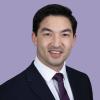Mr Patrick Grover, Consultant Skull Base and Vascular Neurosurgeon
Mr Patrick Grover is a neurosurgeon who specialises in skull base and vascular neurosurgery - as well as in radio-surgery. He has particular expertise in managing pathologies such as cranial meningioma, vestibular schwannoma, cavernoma, arteriovenous malformations and aneurysms. This includes providing the full range of management options including open surgical excision, gamma knife radiosurgery or endovascular treatments in collaboration with interventional radiologists. He also manages degenerative spine pathologies including lumbar and cervical disc disease.
After completing his medical training at At Oxford University he undertook degrees in biological sciences and neurosciences with first class honours before completing his medical training at Oxford University Medical School.
Patrick was awarded an NIHR Academic Clinical Fellowship to undertake neurosurgery training in North London at Charing Cross Hospital, the Royal London hospital, Great Ormond Street Hospital for Children and the National Hospital for Neurology and Neurosurgery (NHNN). After completing his training he undertook fellowships in skull base and vascular neurosurgery at NHNN where he was then appointed as a consultant.
Experience
He is local principle investigator for the CARE (Cavernomas a Randomised Effectiveness) and ROAR (Risk of Aneurysm Rupture) studies and sits on the steering committee for the National AVM registry. He is course director for the Queen Square review course and an organiser of London Brain School.
He is lead for cranial neurosurgery at the National Hospital for Neurology and Neurosurgery and Postgraduate Medical Education (PGME) education lead.
Areas of expertise
- Cranial tumours
- Meningioma
- Vestibular Schwannoma
- Cavernoma
- Aneurysm
- Arteriovenous malformation
- Gamma Knife Radiosurgery
- Degenerative Spine pathologies
Personal treatment philosophy
Patient choice is first and foremost. A patient should be fully informed and have the opportunity to access every treatment option in their care journey.
Why did you chose to specialise in neurosurgery?
Neurosurgery tackles some of the most challenging conditions in medicine and gives the clinician the opportunity to benefit patients at some of the most difficult times of their lives.
What makes a ‘good day’ at the office ‘for you’?
The gratitude of a patient and their family at the end of a day of treatments and operating.
What piece of advice do you most often give to your patients?
To take time, consider all the options and the path forwards will become clear. There is a lot of information to take on in an initial consultation, and treatment options often require a period of reflection and discussion with friends and family before committing

